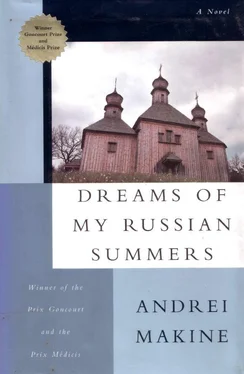I no longer noticed the sequence of stations, only coming to my senses at the last stop. September of the previous year… Alex Bond had been to Saranza in August a year ago. A few weeks after that I had submitted my application for naturalization. Perhaps at the very moment when Charlotte was dying. And all my initiatives, all my projects, all those months of waiting, had already occurred after her life. Outside her life. Without any possibility of connecting with that life, which was finished… The parcel had been kept by the neighbor, and then given to Bond only in the spring. On the brown paper there were a few words written in Charlotte's hand: "Please ensure that this envelope reaches Alexei Bondarchenko, who will be good enough to convey it to my grandson."
I got onto another train at the end of the line. As I opened the envelope I offered myself the sad solace that it was not the decision of the official that had in the end wrecked my project. It was time. Time, endowed with a grinding irony, and which, by means of its tricks and inconsistencies, is forever reminding us of its indifferent power.
All the envelope contained was a score of manuscript pages stapled together. I was expecting to read a farewell letter, so I could not understand this length, knowing how little Charlotte was given to solemn turns of phrase and verbal effusions. Not feeling able to embark on a full reading, I leafed through the first few pages, without anywhere encountering expressions in the manner of "when you read these lines I shall no longer be here," which was just what I was afraid of finding.
In fact, at its start the letter did not seem to be addressed to anyone. Skimming rapidly from one line to another, from one paragraph to the next, I thought I grasped that this was a history quite unconnected with our life at Saranza, or with the imminent end that Charlotte might have hinted at for me…
I left the Métro and, not wanting to go up right away, continued with my absentminded reading, seated on a bench in a park. I now saw that Charlotte's story did not concern us. In her elegant and precise handwriting, she was transcribing a woman's life. Inattentive, I must have skipped over the place where my grandmother explained how they had become acquainted. In any case, that mattered little to me. For the tale of this life was only the fate of one more woman, one of those tragic destinies from Stalin's time, which shocked us when we were young, whose pain had since become dulled. This woman, the daughter of a kulak, had as a child experienced exile in the marshlands of western Siberia. Then after the war, accused of "anti-kolkhoz propaganda," she had ended up in a camp… I perused these pages like those of a book I knew by heart. The camp; the cedar trees that the prisoners cut down, sinking in the snow up to their waists; the daily, banal cruelty of the guards; sickness; death. And the forced love, under the threat of a weapon or of an inhuman workload; and the love bought with a bottle of alcohol… The child that this woman had brought into the world won relief for its mother: such was the law. In this "women's camp" there was a hut, set apart, provided for those births. Then the woman died, crushed by a tractor, a few months after the amnesty, decreed at the time of the thaw. The child was almost two and a half…
The rain drove me from my bench. I hid Charlotte's letter under my jacket. I ran toward our house. The interrupted story seemed to me very typical: at the first signs of liberalization, all Russians had begun to bring out the censored past from the deep hiding places of their memory. And they did not understand that history had no need for all these innumerable little Gulags. A single monumental one, recognized as a classic, sufficed. In sending me her testimonies, Charlotte must have succumbed like the others, by the intoxication of glasnost. The touching uselessness of this missive upset me. Once again I had a measure of the disdainful indifference of time. This woman prisoner with her child was hovering on the brink of ultimate oblivion, held back only by these few manuscript pages. And Charlotte herself?
I pushed open the door. A draft stirred the two halves of an open window with a dull crash. I went to my grandmother's room to close it.
I thought about her life. A life that linked such different eras; the start of the century, that almost archaic age, almost as legendary as the reign of Napoleon, and – the end of our century, the end of the millennium. All those revolutions, wars, failed Utopias, and successful terrors: she had distilled their essence in the sorrows and joys of her days. And this throbbing body of lived experience would soon sink into oblivion. Like the miniature Gulag of the prisoner and her child.
I stayed at Charlotte's window for a moment. For a number of weeks I had imagined her gaze resting on that view…
That evening, mainly from an access of conscience, I decided to read Charlotte's pages to the end. I went back to the imprisoned woman, the atrocities at the camp, and the child who had brought a few moments of serenity into this hard, defiled world. Charlotte wrote that she had been able to obtain permission to come to the hospital where the woman was dying…
Suddenly the page I was holding in my hand was transformed into a fine sheet of silver. Yes, it dazzled me with a metallic reflection and seemed to emit a cold, thin sound. One line flashed out – like the filament of a lightbulb lacerating one's eyeball. The letter was written in Russian, and it was only at this line that Charlotte switched to French, as if she were no longer sure of her Russian. Or as if French, that French of another era, would allow me a certain detachment from what she was about to tell me: "That woman, who was called Maria Stepanovna Dolina, was your mother. It was she who wanted you to be told nothing for as long as possible…"
A little envelope was stapled to that last page. I opened it. In it was a photo that I recognized without difficulty: a woman in a big shapka with the earflaps pulled down, wearing a padded jacket. On a little rectangle of white cloth sewn beside the row of buttons – a number. In her arms a baby swathed in a cocoon of wool…
That night I rediscovered in my memory the image that I had always believed to be a kind of prenatal reminiscence, coming to me from my French ancestors, and of which, as a child, I was very proud. I used to see in it a proof of my hereditary Frenchness. It was that autumn day bathed in sun, at the edge of a wood, with an invisible feminine presence, a very pure air, and the gossamer threads rippling across the luminous space… I now understood that the wood was in fact an endless taiga, and that the delightful Indian summer was about to be swallowed up into a Siberian winter that would last nine months. The gossamer threads, silvery and light in my French fantasy, were nothing other than new strands of barbed wire that had not had time to rust. I was out for a walk with my mother in the territory of the "women's camp."… It was my first childhood memory.
Two days later I left the apartment. The owner had come round the day before and had agreed on an amicable solution: I left him all the furniture and antique objects I had accumulated over several months…
I slept little. At four o'clock I was already up. I packed my rucksack, planning to leave that very day for my habitual journey on foot. Before departing I glanced one last time into Charlotte's room. By the gray light of morning its silence no longer evoked a museum. No longer did it seem uninhabited. I hesitated for a moment, then I seized an old volume laid on the windowsill and went out.
The streets were empty, misted over with sleep. Scenic views seemed to take shape as I walked toward them.
I thought of the Notes I was carrying away in my bag. That evening, or the next day, I told myself, I would add a new fragment that had come to mind that night. It was at Saranza during my last summer at my grandmother's… That day, instead of taking the path that led us across the steppe, Charlotte had turned in among the trees of the copse cluttered with weaponry that the locals called "Stalinka." I had followed her with a wary tread: according to rumor, you could step on a mine in the thickets of the Stalinka… Charlotte had stopped in the middle of a broad clearing and had murmured, "Look!" I had seen three or four identical plants that reached up to our knees. Great indented leaves, tendrils clinging to the slender canes stuck in the ground. Dwarf maples? Young blackcurrant bushes? I did not understand Charlotte's mysterious joy.
Читать дальше












